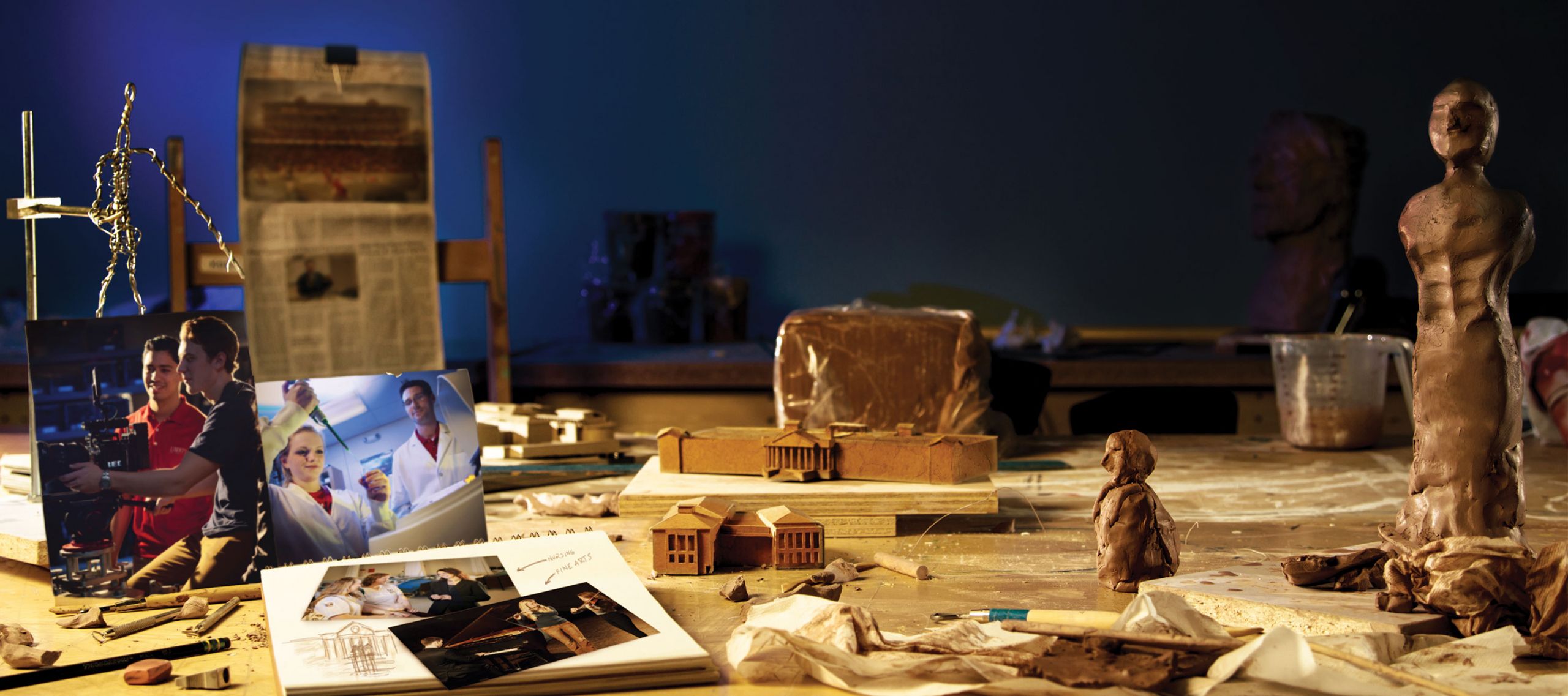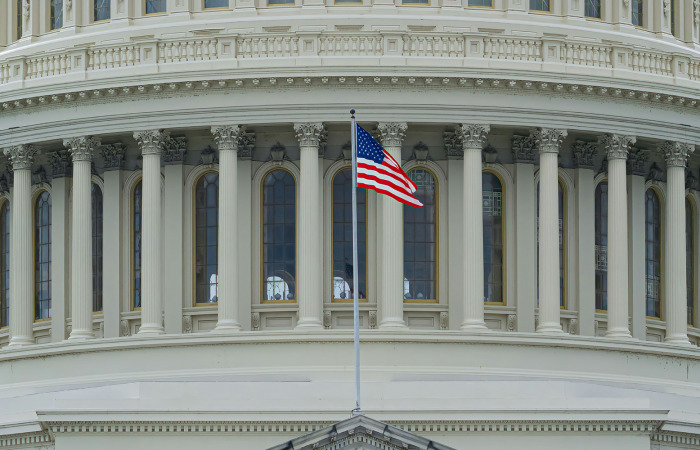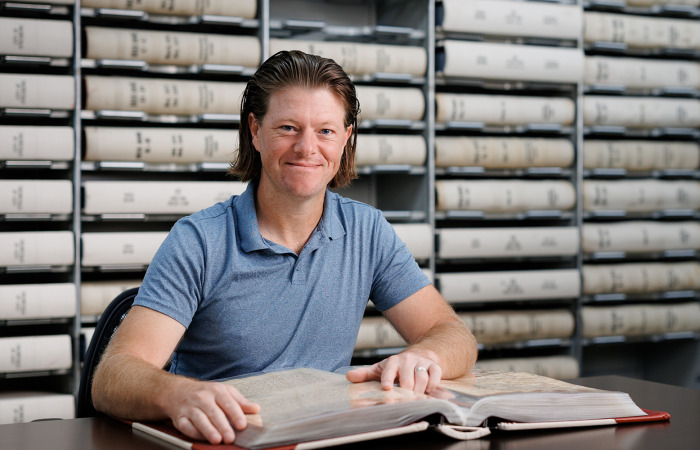In 1971, the year Liberty University was founded, options were limited for evangelical young people who wanted to attend a Christian college. The only choices were small campuses with few athletic opportunities and narrow curriculums. Those who chose the “big college” experience at a secular school would often find that the atmosphere there was hostile to their Christian values — and even to some American values.
Liberty has aimed to change all that — and more.
As enrollment has soared to more than 100,000 students in the last decade (that’s 10 times more than it was in 2000), Liberty has begun to emerge as a new model for higher education in the United States. By standing on a Christian foundation while offering world-class academics and competitive athletics, adopting a sustainable business model, and keeping education affordable, Liberty is approaching education from a different angle. The school is embracing its revolutionary role in redefining what it means to be a prestigious university.
Results already show that many alumni credit Liberty for helping them obtain the knowledge and essential life skills to become successful in their chosen fields.
Character counts
President Jerry Falwell, Jr. attends College For A Weekend (CFAW) events throughout the year, where prospective students and their parents experience life at Liberty firsthand. One of the things he stresses to parents is that Liberty is passionate about turning out graduates “who not only know how to make a living, but how to live.”
The character that can be developed in students when a Christian mission is at the forefront of their education is invaluable. When students not only learn the coursework, but also responsibility, an honest work ethic, and an all-around attitude of service to others that is inherent in Christian teachings, they stand out to employers. Liberty’s Career Center frequently receives requests from businesses seeking graduates who have the type of character needed to succeed.
Many of the country’s oldest universities were founded on Christian principles, but as they climbed to a prestigious perch and became prominent for their academic and athletic achievements, they abandoned their founding principles and original mission. Liberty’s goal is to become the first institution of higher learning to join the ranks of the country’s most accomplished universities without forsaking its spiritual foundation.
Realizing potential
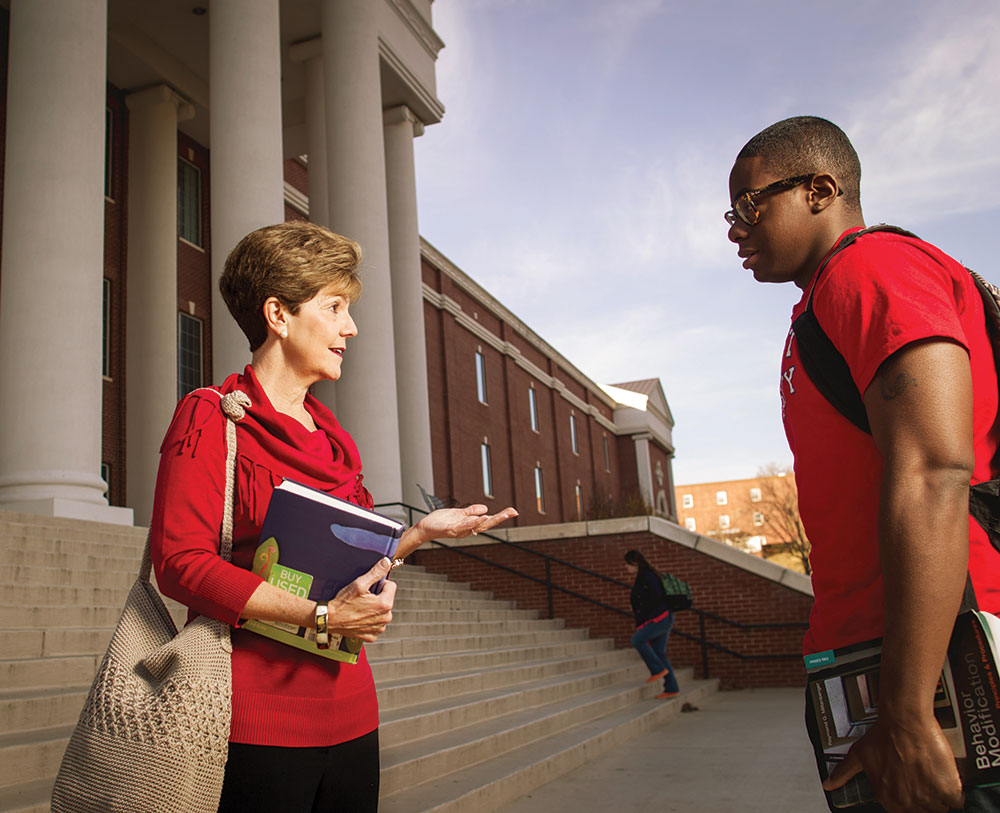
Denise Green meets with one of her former students, Shaquille Cook.
Part of what makes Liberty unique is that its administration and faculty are committed to the Christian mission and their priorities are centered around helping students reach their full potential. There is no better evidence for this than Liberty’s Bruckner Learning Center, where a time-tested system is in place to help boost the confidence of any first-year students who may be facing challenges or anxieties about college life as they transition from high school.
Denise Green, assistant director for academics at the center, is the lead teacher for the center’s mentoring classes. She believes that a one-on-one relationship is key if professors want to help their students overcome academic challenges.
“Students often just need to know someone cares,” she said. “When we take the time to understand what may be holding them back, to teach them practical life lessons, and to encourage them, they will exceed society’s expectations. This is definitely something that doesn’t happen at other colleges. We are seeing many success stories every year.”
Junior Shaquille Cook, one of Green’s former students who calls her “Mama Green,” said the lessons he learned in her class were invaluable.
“The class went beyond the education part. Helping me for those three months has helped me out for a lifetime,” he said.
Like many students, Cook had a plan, but was unsure how to make it happen.
“I talked to her about my plans; she gave me advice on what I might need to do in order to make my plans happen 10 years from now,” he said. “The relationships with Liberty professors like her go beyond the paper that’s due next week, beyond the test coming up on Thursday. It’s a relationship you’ll be grateful for throughout your life. Ten years from now I know I’ll be thankful that my professors weren’t just my professors, but actually cared about my future, and spent time after class when they could have been doing something else.”
A psychology major, Cook was so encouraged by Green and other professors to persevere in his studies that he now plans to earn a master’s degree and eventually start his own counseling practice.
While the most elite colleges in the country continue to grant admission to only those with the highest test scores and best transcripts, Liberty is breaking the mold and finding that more students, when given the extra attention they need, can achieve more than they ever expected.
“Liberty’s goal is to redefine what is considered an academically prestigious university,” Falwell has said in recent interviews. “In the near future, we believe the top universities will not be considered prestigious based on how many students they turn away, but rather by how many they accept and how well they educate those students and help them realize their potential.”
In a Forbes magazine article last year, business magnate Bill Gates remarked on the flaws in the national college ratings system. Forbes quoted Gates as saying that “the problem is that it gives credit to schools that attract the best students rather than schools that take poorly prepared students and help them get ready for the next stage. The control metric shouldn’t be that kids aren’t so qualified. It should be whether colleges are doing their job to teach them.”
Falwell said Liberty is doing just that.
“Liberty cares more about helping its students than about scoring highly in rankings and surveys that use the wrong criteria to measure a college’s success,” Falwell said. “While other institutions are being rewarded for being selective, we are changing the model. We measure where students are when they begin and where they are when they leave, and see how much we have helped them while they are here.”
Individual Attention
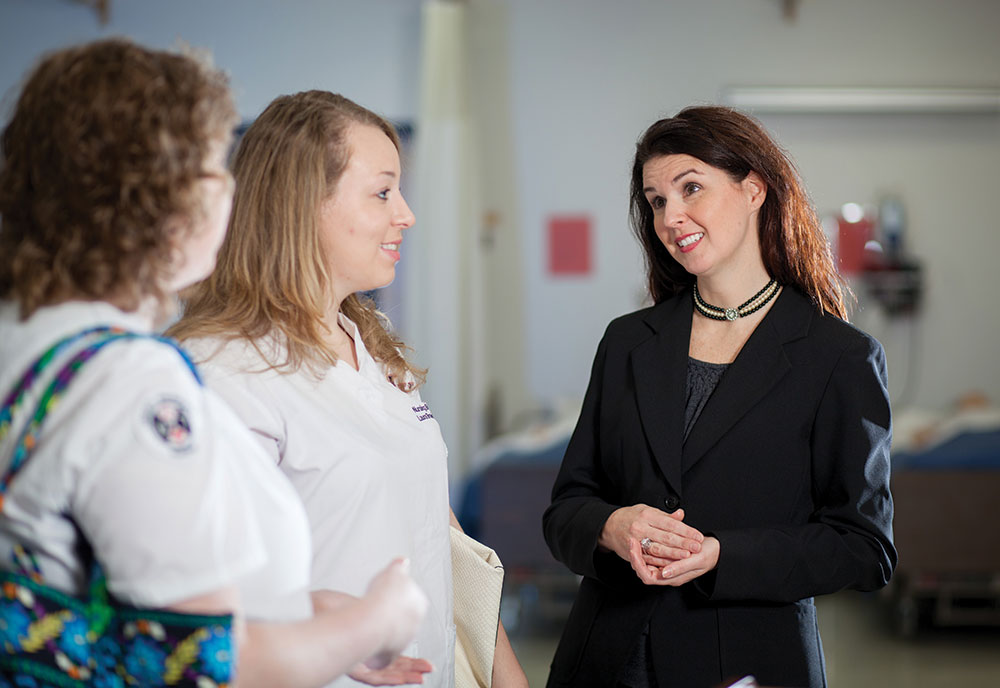
Assistant nursing professor Kathy Miller speaks with students Catherine Thomas (left) and Brooke Priest.
The caring nature of Liberty professors has made an impact on nursing majors Catherine Thomas and Brooke Priest. With a rigorous schedule of classes, labs, practicums, and studying for certification tests, they said they appreciate the personal care they receive, especially when difficult family circumstances have occurred that would make it hard for any college student to keep their focus.
Priest experienced this compassion in her freshman year when her mother was diagnosed with an incurable brain disease and she was called to her side to help care for her. Priest said Kathryn Miller, an assistant professor of nursing, called her father that semester to share her concern and prayers.
“She really showed me what this school was about. I know they want to help me academically, but she has been there for me spiritually, and for my family,” Priest said. “She really takes her students under her wing. We’re like her children.”
Thomas said professors also reached out to her when her parents divorced.
“I feel like every professor here prays for us. They are genuinely concerned,” she said. “They know what’s important.”
Avenues for learning
As a pioneer in distance education, Liberty has also broken the mold for how education is delivered. Liberty is now the nation’s largest private, nonprofit online educator, with more than 90,000 students studying from their own homes across the globe.
“We’re training adults who can’t uproot their families and leave their jobs to go back to college,” Falwell said. “This model of education makes sense for them. It’s helping them advance their careers or start new careers.”
Adults who study primarily online enjoy all that the school’s Lynchburg campus has to offer as well. Many online students attend Homecoming activities, many take intensive classes on campus, many graduate at Liberty’s annual ceremonies in May, and many participate in the weekly Convocation services and attend athletic events (or keep up with the Flames on TV). A world-class campus is rare among major online universities and is part of what makes Liberty unique.
Liberty students can even choose a blended format in which residential students have the option of taking online courses (and vice versa) to help move them ahead on their paths to earning a degree.
Financial health
While its educational model focuses on individual student success, Liberty’s business model supports that same goal by keeping education affordable and accessible for all. National news reports show that Liberty’s financial strength distinguishes it from other institutions.
A USA Today article, “Jerry Falwell’s legacy: A thriving Liberty University,” (Sept. 14, 2013), reports that Liberty is unlike most private nonprofit colleges who “have remained cautious with their budgets amid lingering economic uncertainty.” It noted Liberty’s $500 million campus rebuilding now underway and its more than $1 billion in net assets (reached in 2012). “(Liberty’s) business strategy, including competitive tuition and attention to customer service, is earning praise from financial analysts,” the article reads.
Liberty’s net assets increased from approximately $100 million in 2007 to over $1 billion in 2012 as a result of increasing support from donors, responsible fiscal management, and almost unprecedented enrollment growth. Liberty is the first evangelical Christian university — and one of the youngest American universities ever — to reach this mark. It has remained among the most affordable of all private universities in the nation and continues to award over $100 million of institutional aid to its students each year.
Karen Kedem, a vice president for Moody’s Investors Service, told USA Today: “It is quite an unusual picture. (Liberty is) continuing to see robust revenue growth, a stark contrast in what we’re seeing at a majority of our universities.”
Moody’s announced in September that it upgraded Liberty’s bond rating from A1 to Aa3 with a stable outlook, placing it among the 71 top-rated universities in the nation.
The report showed that over a four-year span, from fiscal 2008 to fiscal 2012, Liberty’s operating revenue grew 630 percent while cash and investments rose 148 percent.
“The growth in revenue and cash and investments makes Liberty a true outlier in Moody’s portfolio of not-for-profit universities,” the report reads. “This momentum, if continued, will produce sufficient cash to fund transformative capital investments as well as to build reserves over time.”
Moody’s said the upsurge is “more than twice the growth of any other rated university on either measure.”
The Washington Post also reported on this achievement, noting that, “By contrast, many colleges and universities in that span have run into choppy financial waters. Some have had credit rating downgrades.”
A report conducted by Bain & Company and Sterling Partners in 2012 showed that about one-third of all colleges and universities in the United States have financial statements that are significantly weaker than they were several years ago. Those schools had “more liabilities, higher debt service, and increasing expense without the revenue or the cash reserves to back them up,” according to the report. The Christian Post dove further into the study and found that Liberty was one of seven Christian institutions to make the list of financially sound schools. A number of others were considered at risk of becoming financially unsustainable.
A solid business model and promising financial outlook have allowed Liberty to invest in world-class facilities, with classrooms and labs equipped with cutting-edge technology to ensure that students are exposed to the latest advancements in their fields. While other schools are cutting back their programs, Liberty is expanding at a rapid rate, adding to its already diverse curriculum. Liberty offers more than 300 programs of study from the associate to the doctoral level with a depth and breadth that reflect a commitment to Training Champions for Christ in areas that meet today’s market demands.
Falwell said the university’s frugal operations are helping to propel its prosperity.
“For many years we just survived. We’ve been through tough times; we know what it is like to struggle to stay open. Those times are behind us,” he said. “What is wonderful is that we are now able to keep costs down and focus on what matters most — our students. We now have the resources to completely rebuild our campus and we are using them to build state-of-the-art, beautiful buildings, all for our students and for the future.”
The greatest benefit to experiencing financial health, however, is not the new buildings, the impressive academic programs, the low tuition, or the prestige of having NCAA Division I athletics teams: “It is being able to resist the negative influences that often cause universities to abandon their Christian mission,” he said. “Liberty is so blessed.”
